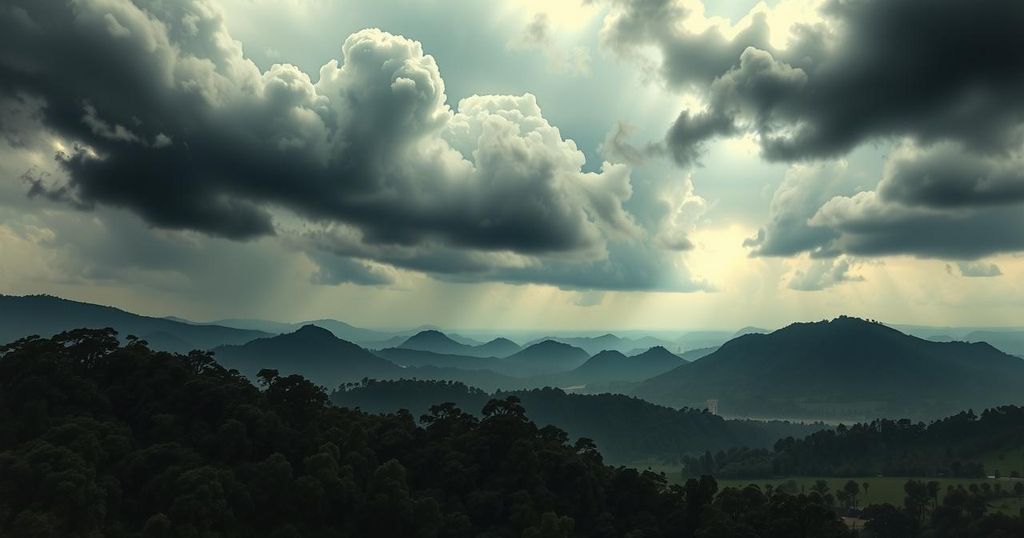The DRC is experiencing renewed conflict as M23 rebels advance with alleged Rwandan support. Recent violence has led to thousands of deaths and displaced communities. Uganda is also deploying troops, raising fears of a regional escalation reminiscent of past Congo wars. Analysts stress the need for negotiation and reform to address systemic issues and prioritize Congolese welfare.
The escalating conflict involving M23 rebels in the Democratic Republic of the Congo (DRC) has resulted in communities preparing for war or fleeing for safety, following recent victories in key cities like Goma and Bukavu. The rebel group, allegedly supported by Rwanda, is targeting the mining hub of Walikale, amidst a backdrop of violence that has claimed about 7,000 lives since January. The DRC government’s offer of a $5 million reward for capturing M23 leaders has failed to deter them.
As M23 rebels advance in North and South Kivu, Ugandan troops have stepped up their presence in Ituri province, closer to DRC’s conflict zones. They are ostensibly engaged in battles against other armed groups like the Allied Democratic Forces and CODECO, which has caused renewed violence, prompting more Ugandan troop deployments. Analysts warn that such military involvement from Rwanda and Uganda harkens back to the devastating Congo wars and could escalate into a broader regional conflict.
Political experts liken current developments to the Second Congo War, where both Rwanda and Uganda played significant roles. The original conflicts led to significant casualties, resource exploitation, and the rise of multiple armed groups, including M23. Despite past international outrage over the humanitarian crisis, the illegal mining and associated human rights violations continue, with global demand for DRC’s mineral wealth exacerbating the situation.
For over thirty years, the DRC has endured low-level violence attributed to multifaceted issues, such as ethnic tensions, resource grabs, and political corruption. Rwanda’s military interventions for Hutu militants initiated both the First and Second Congo Wars. Over time, numerous regional powers and local militias became embroiled in the conflict, leading to a complex dynamic in the DRC’s political landscape.
Although low-intensity violence continues, comprehensive reports have underscored the illegal resource exploitation by foreign and local actors, further complicating the conflict. In recent legal developments, Uganda has been ordered to compensate the DRC for wartime damages, while ongoing legal proceedings against Rwanda claim violations of Congolese sovereignty.
Currently, both Rwandan and Ugandan forces are involved in the DRC conflict, with the former’s support of M23 becoming increasingly documented. With political and military positions divided, DRC’s resource-rich eastern regions remain a focal point. Analysts stress the importance of international and regional efforts to foster negotiations between the DRC government and armed factions, addressing both external intervention and internal governance challenges. This entails managing widespread corruption and addressing grievances within marginalized communities.
A recent move by the DRC government to initiate national dialogue and regional peace talks is crucial. Visiting representatives from international bodies have also pledged accountability for rights violations perpetrated during the conflict. Experts emphasize that prioritizing the safety and wellbeing of the Congolese people is vital for any meaningful recovery and stability in the region, as ongoing turmoil undermines not just the DRC but also broader continental aspirations.
The DRC is facing a resurgence of conflict, highlighted by the advance of M23 rebels and significant military involvement from Rwanda and Uganda. Historical patterns echoing past wars raise concerns for the potential of broader regional instability. The DRC’s humanitarian and political crises call for urgent international attention and domestic reforms to establish peace and address longstanding grievances. A focus on the safety of Congolese citizens is crucial for the future stability of the region.
Original Source: www.aljazeera.com






